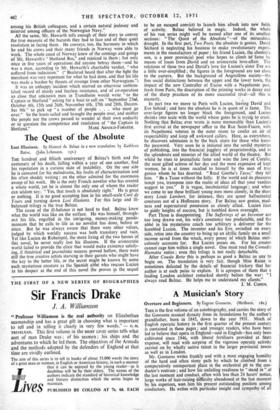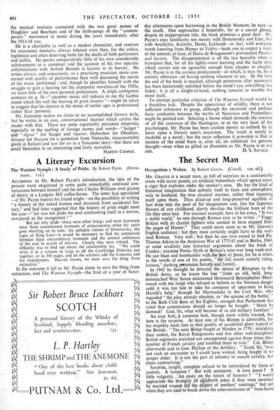A Muiician's Story
Overture and Beginners. By Eugene Goossens. (Methuen. t8s.) THIS is the first volume of an autobiography, and carries the story of the Goossens musical dynasty from its foundations by the author's grandfather, born in 1845, down to the year 1931. Much of English operatic history in the first quarter of the present century is contained in these pages ; and younger readers, who have been led to believe that opera in England—and in English—has only been cultivated since 1946, with liberal fertilisers provided at State expense, will read with surprise of the vigorous operatic activity carried on by wholly native talent in the larger provincial towns as well as in London.
Mr. Goossens writes frankly and with a most engaging humility
of the hard and often stony path by which he climbed from a comparatively unimportant place in the orchestral pit to the, con: ductor's rostrum ; and how his unfailing readiness to " stand in " at the last moment and conduct, often with less than 24 hours' notice, large works of hair-raising difficulty abandoned at the last moment by his superiors, won him his present outstanding position among conductors. He writes with particular insight and sympathy of all the musical ventures connected with the two great names of Diaghilev and Beecham and of the birth-pangs of the " contem- porary " movement in music during the years immediately after the 1914-18 war.
He is a charitable as well as a modest chronicler, and reserves his occasional mockery, always tolerant even then, for the critics, legitimate and often deserving butts for the shafts of both performers and public. He speaks comparatively little of his own considerable achievements as a composer and the account of his two operatic collaborations with Arnold Bennett is laconic in its brevity. He writes always, and consciously, as a practising musician, more con- cerned with quality of performance than with discussing the merits of the music performed ; and, though he identifies himself with the struggle to gain a hearing for the unpopular novelties.of the 1920s, we learn little of his own personal. preferences. A single ambiguous sentence on p. 56—" chamber music still induces in me the Gothic mood which fits well the hearing of great classics "—might be taken to suggest that his interest in the music of earlier ages is professional rather than personal.
Mr. Goossens makes no claim to an accomplished literary style, but he writes in an easy, conversational manner which carries the reader with him. There are some regrettably persistent misprints, -.especially in the spelling of foreign names and words—" Sanget " and " rigeur" for Sauget and rigueur, Oubouhov for Obukhov, birsogne for bisogna (in a quotation from Nietzsche, unaccountably given in Italian) and non for no in a Toscanini story—but these are small blemishes in an interesting and lively narrative.
MARTIN COOPER.



































 Previous page
Previous page